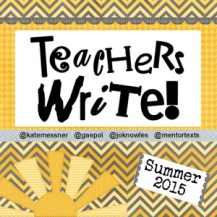For the fourth summer in a row, Kate Messner, Gae Polisner, Jo Knowles, and Jen Vincent are hosting Teachers Write!, a wonderful online summer writing camp. What began as the result of a comment during a Twitter chat has grown into a huge community and even inspired a book, 59 Reasons to Write (Stenhouse, 2015).
Yesterday, Kate kicked off the 2015 season with an invitation to wonder. Kate writes that wondering is where authentic writing starts, that “Wonder is essential for writers, but sometimes, we don’t leave time for it in our daily task-finishing, dinner-making, laundry-sorting lives.” Unfortunately, this is often true in our classrooms, too.
I usually make time for wondering during my drive to work and when I’m walking my dog, so it didn’t take me long to come up with a list, which soon morphed into a poem:
What wonders does the world behold?
a chirping robin greeting the dawn
a mighty river carving stone
a million stars shining in the sky above
the ringing of a telephone
the warmth of your hand in mine
finding a friend in the pages of a book.
Not sure what I would do with this list, I went about my morning. Within an hour, I heard a story on NPR about the NASA’s New Horizons mission to Pluto. Of course I started wondering what discoveries will be made about this most-mysterious non-planet. The similarities between the word “planet” and “Pluto” popped out at me, and I started thinking about how to work this into a poem.
J. Patrick Lewis says that in poetry, like architecture, “form follows function.” My work-in-progress has me thinking a lot about poetic forms. Lately, I’ve been working on a diamante (Which J. Patrick Lewis doesn’t consider a true verse form; read why here.) because it seemed like the form might help me accomplish my purpose for writing. This form also seemed like it might work for a planet/Pluto poem. Here’s a draft:
Planet
celestial, spherical
orbiting, rotating, reflecting
rock, solar system, outcast
freezing, wandering, eluding
distant, mysterious
Pluto
While there are parts of this I like, I wasn’t thrilled with it. Still wondering, I did a little research. Tricia Stohr-Hunt’s blog, The Miss Rumphius Effect is a treasure-trove of poetic resources, so I checked her site for more information. Coincidentally, Tricia’s post yesterday was about cinquains, another short form with a strict pattern. So I decided to try the Pluto poem as a cinquain.
Frozen,
rocky mystery
wandering at the edge
of our solar system; outcast:
Pluto
I’m still pondering this one, but playing around with different forms was fun. It also helped me see a new possibility for a poem that’s been challenging to write. In addition, a few implications for teaching became clear as I was writing.
Asking a child, “What are you wondering about?” is such simple act, yet how often do teachers do it? What a gift it would be to ask our students this fundamental question each morning! What a list kids would generate! If we did this, then all the moaning about not knowing what to write about or groaning about making revisions might fall by the wayside. When you’re truly invested in what you’re doing, it doesn’t feel like work. And who knows where their questions will lead?
Thank you Kate, and everyone at Teachers Write! for the inspiration, and thank you to Stacey, Tara, Dana, Betsy, Anna, and Beth for this space for teachers and others to share their stories each Tuesday. Be sure to visit Two Writing Teachers to read more Slice of Life posts.



Your post reminds me of one of my favorite professional books, A Place to Wonder. Thank you for sharing about Teachers Write and for sharing your “wonderings!”
LikeLike
Catherine,
Thanks for sharing the “wonder” of your journey from questions to multiple poems! It’s so important to show/provide multiple opportunities!
LikeLike
I love the musing that transpires on this page, and how you allow us–through your blogging know-how–to connect to the very same online resources that you unearthed. The second Pluto poem, though shorter, communicated the isolation of Pluto. Good stuff.
LikeLike
I love following the wonderings of your mind today through your daily walk to poetic forms. I am joining in Teachers Write, but just got in and feel already behind. Thanks for sharing.
LikeLike
It is important to take time for all the thoughts, & yes, teachers don’t often do that, nor do we in our busy lives. Your process of taking the time, learning more, then wondering again, is illuminating, all from a simple question. I enjoyed reading this, Catherine. Thanks!
LikeLike
I love the way you played with your Pluto poems. The word outcast resonates for me. It’s an outlier in so many ways. Undefinable. Seems like and interesting character.
That wonder work stretches muscle we don’t use enough. So many implications for us and our students!
It’s not always comfortable. I’m trying though!
LikeLike
Catherine, I wonder that beginning the morning with wonder in the heart and mind results in a whole different sort of day. I loved your process. Thanks for sharing your thinking.
LikeLike
Very nice! I love asking kids what they are wondering, just gotta make sure you have plenty of time…
LikeLike
Catherine, I like Julieanne loved the word outcast in your poems. It was interesting to see your process for wondering also. I am wondering what you think of the title of the next gallery:Summer Splashings. I wanted to make this one fun and full of frolic while splashing voice across the Twittershphere. Hope you join in.
LikeLike
I love that Kate started out with wondering and you picked it up and noticed times to wonder throughout your day. I hope you enjoy Teachers Write this year.
LikeLike
I love the journey through your wondering and thoughts and writing. I felt like your wonderings alone were poetic.
LikeLike